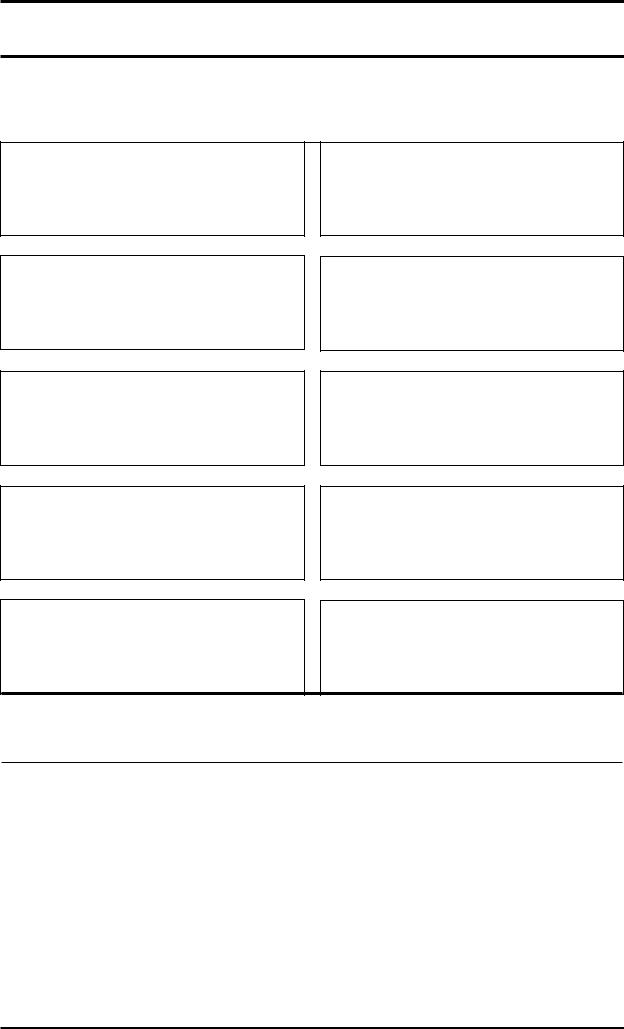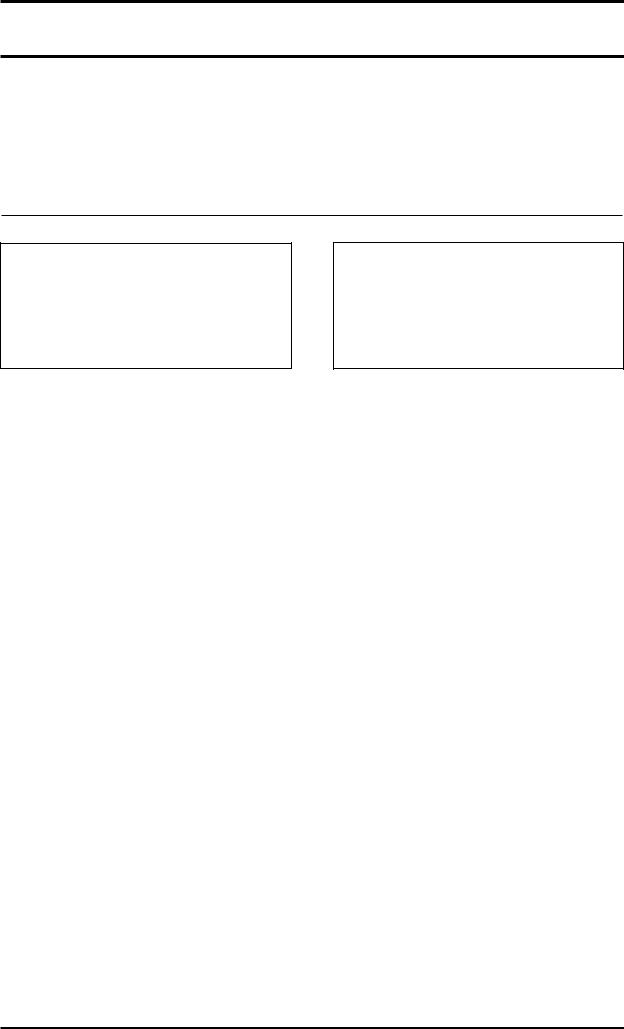
- •Introduction
- •Contents
- •General Vocabulary
- •Adjectives to nouns
- •Compound adjectives
- •Compound nouns
- •Confusing pairs and false friends
- •Contrast and comparison
- •Expressions with get
- •Human actions
- •Materials
- •Modified words
- •Noises
- •Nouns and verbs to nouns
- •Opposites 1
- •Opposites 2
- •Opposites 3
- •Prepositions
- •Shape and size
- •Spelling
- •Verbs to adjectives
- •Verbs to nouns
- •Working words
- •Accommodation
- •The arts
- •Character and personality
- •Clothes
- •Crime
- •Education
- •Food and drink
- •Free time activities
- •Geography
- •Health
- •Learning languages
- •The media
- •Money
- •Nature and the environment
- •On the road
- •Relationships
- •Services and facilities
- •Shopping
- •Sport
- •Travel and holidays
- •24 hours
- •Work
- •Answers

Materials
Task 1. ADJECTIVES AND NOUNS
The words in bold are in the wrong sentences. Put them into the correct sentences. In several cases, more than one word is possible.
1.He was wearing a pair of timber trousers.
2.We put the glasses into polyester boxes.
3.We used an old piece of wool as a roof for the hut.
4.She keeps her collection of precious Chinese rubber in a glass case.
5.After the rain, the dry satin on the football pitch suddenly turned wet and sticky underfoot.
6.He was wearing a pair of old corrugated iron shoes.
7.The house is surrounded by a high silk wall.
8.The carpet in our living room is made of leather.
9.Why are cork bedsheets so cold?
10.He was wearing a porcelain jacket.
11.She placed little stained glass mats on the table to stop the wine glass marking it.
12.He bought two plastic shirts in the sale.
13.She was wearing a beautiful cardboard scarf.
14.Canterbury Cathedral is famous for its corduroy windows.
15.She was wearing a thick stainless steel coat.
16.We take fur plates when we go for picnics on the beach.
17.She wore little red iron slippers.
18.She bought a white wooden tablecloth.
19.He was wearing a pair of blue turf shoes.
20.I bought her a set of cotton saucepans.
21.The roof is made with denim from an old ship.
22.I wore a pair of suede overalls when I painted the living room.
23.Car tyres are made of canvas.
24.There's an old linen table in the kitchen.
25.The old gates are made of nylon.
26.My new shoes have got brick soles.
vocabulary general
15
For reference, see the Easier English Dictionary for Students (0 7475 6624 0)

general vocabulary
Materials
Task 2. GUESS THE OBJECT
Look at the following descriptions and decide what is being described in each one. You might find it useful to look at the unit on shape and size on page 38 to help you with some of the descriptions.
1. It's rectangular and made of plastic. It's flat. It measures about 8cm x 5cm. It can be a variety of colours. You can carry it in your wallet or purse.
3. Traditionally its triangular and made of canvas, although most modern ones are made of nylon and come in a variety of shapes and sizes.
2. It's round, with an open top and a flat bottom. It comes in different sizes. It's made of stainless steel or iron so it can stand a lot of heat.
4. It's cylindrical and made of light bark, although nowadays you can also find plastic ones. It's not very big. When you remove it, it makes a loud 'pop!'
5. It's made of plastic and iron. It's wide at one end and narrow at the other, with a plastic handle on top. Most of them are designed to spray water. The bottom part gets very hot.
7. They're made of denim and are usually blue, although you often see them in black or white. They're very popular with younger people because they're casual and comfortable.
9. It's usually made of wool and is long, flat and rectangular. Football fans often have one with the name of their favourite team on. It's particularly useful in winter.
6. It's long, thin and made of fabric such as silk or cotton. It can come in a variety of colours and patterns. Men use them more than women, especially at work.
8. It's an irregular shape, and it's made of china or porcelain. It has a handle, a spout for pouring and a lid. You should be careful not to drop it, as it will probably break if you do.
10.It's spherical and made of leather, although cheaper ones are made of plastic or rubber. It's about 30cm in diameter. It's usually white, even though it gets dirty quickly.
Task 3. IDIOMS, COLLOQUIALISMS AND OTHER EXPRESSIONS
Look at the following sentences and choose the correct definition for the words and expressions in bold.
1.Politicians try to be careful not to wash their dirty linen in public.
A.tell dreadful personal secrets about themselves and their family
B.say bad things about other politicians
C.drink, smoke or do other things that people might not like
2.The estate agent tried to pull the wool over our eyes.
A.to charge us too much money
B.to take our money with out giving them anything in return
C.to deceive us by not telling us the true facts
16
For reference, see the Easier English Dictionary for Students (0 7475 6624 0)

Materials
3.I don't have any cash with me. Do you take plastic?
A.cheques
B.credit cards and charge cards
C.U.S. dollars
4.We spent our last holiday under canvas.
A.In a beach resort
B.In a very cheap hotel
C.in a tent
5.We turfed out our old office furniture.
A.sold
B.threw out
C.burnt
6.The thief had a cast-iron alibi.
A.an alibi that cannot be disproved.
B.a very weak alibi
C.a very unlikely alibi
7.She will have to steel herself to say what happened.
A.she'll have to pretend to be sad
B.she'll have to refuse to say what happened
C.she'll have to get ready to do something that she does not like
8.A lot of young people end up living in cardboard city.
A.a place where homeless people build themselves shelters out of pieces of cardboard
B.their parents' home
C.with their girlfriend or boyfriend
vocabulary general
17
For reference, see the Easier English Dictionary for Students (0 7475 6624 0)

general vocabulary
18
Modified words
We can sometimes add prefixes to change, or modify, the main meaning of a verb, noun or adjective without making it into an opposite (e.g., pay - overpay - underpay)
The prefixes we use to do this are:
For verbs: over- , under- , pre-, fore-
For adjectives: over- , under- , pre- , fore- , pro- , anti- .
For nouns: pre- , post- , anti- , pro-, under-
Complete the sentences below with a combination of a prefix from box A and a word from box B.
A.
anti- |
|
• |
over- |
• |
anti- |
||
under- |
• |
pro- • fore- |
• fore- |
||||
under- |
• |
pre- • post- |
• fore- |
||||
under- |
|
• |
anti- |
• |
over- |
||
B.
armed • Christmas • climax clockwise • due • estimate estimated • European graduates • holiday • mined see • social • warned
1.Everybody told us the film was fantastic, so we were quite excited about seeing it. Unfortunately, it wasn't very good. It really was quite an ________.
2.Do you ________ any problems with the visa? I need to know as soon as possible if we're likely to
have difficulties.
3.Everyone's suffering from ________ depression. After such a nice break in Spain, the gloomy weather back here in England is making us all miserable.
4.The figure of £50,000 was a bit of an ________ . It actually cost us almost £70,000.
5.She's ________ and believes that the country should remain part of the European Union.
6.He's very ________, and ignores all our attempts to talk to him or make him feel part of the group.
7.A lot of ________ from the university are trying to get holiday jobs so that they have some spending money next term.
8.She was ________ with good advice before she went into the interview.
9.He was driving ________ round the ring road when the accident took place. If he had been going the other way, he would have been all right.
10.We were ________ of trouble by our spies and took guns to the meeting.
11.I always read my horoscope so that I can ________ what will happen to me during the week.
12.Her library books were ________ by four weeks, so she had to pay a fine of almost £8.
13.He ________ my confidence by telling me that everyone hated me.
14.Last December we had so many ________ parties that by the time the big day arrived I couldn't eat or drink another thing.
15.He ________ the amount of time needed to decorate the house; he thought it would take five days but it only took three.
'Forewarned is forearmed' is an English expression which means that if you know about something before it happens, you will be better prepared.
Person A. 'Mr Jenkins wants to see me in his office.'
Person B. 'Be careful. He's in a really bad mood this morning'
Person A. 'Thanks. Forewarned is forearmed!'
For reference, see the Easier English Dictionary for Students (0 7475 6624 0)
